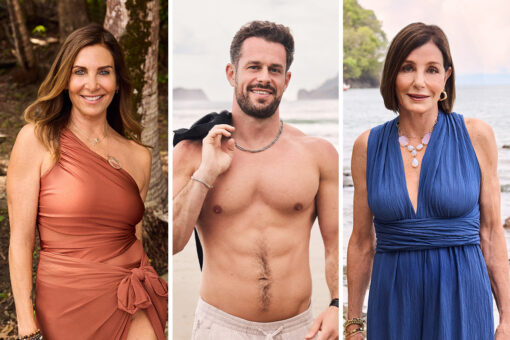The climate crisis has been impossible to ignore this summer, from intense tropical storms in Southern California and Nevada to wildfires devastating Maui and much of Canada, to rising ocean temperatures off the coast of Florida. Even for those not directly impacted by these crisis events, it’s easy to feel scared and overwhelmed looking at the destruction and the scope of work that needs to be done.
“Climate grief and anxiety is so real,” says Rabbi Laura Bellows, director of spiritual activism and education for Dayenu: A Jewish Call to Climate Action. “A lot of people are experiencing the effects of climate change now and for those who are struggling, I just want to say, you’re not alone. Dayenu and other organizations offer spaces where people can come together to find a sense of connection and community.”
Founded in 2020, Dayenu works on “mobilizing the American Jewish community around climate action with boldness and spiritual audacity,” Bellows says, and a key component of that work is spiritual adaptation, or using art, music and ritual to acknowledge fear and anxiety, cultivate hope and inspire action. In that spirit, back in May, Dayenu launched a new songbook featuring 64 songs and chants, drawing from ancient liturgy and contemporary pop, to help those in the Jewish climate justice movement process the many heavy emotions that come with the climate crisis and take meaningful action. “As a Jewish people, we have a really rich history of song and ritual and culture that can help us,” Bellows says. “We are here as a broader climate movement, but we are also here to spiritually resource the growing Jewish climate movement so that we can all get on the same page.”
“Rising Tides, Rising Voices: Songs for the Jewish Climate Movement” is an open-source living digital songbook featuring lyrics and audio recordings of more than 60 songs and chants to galvanize the Jewish climate movement. The songbook was curated by Arielle Rivera Korman and Bellows, building on the work of Rabbi Maor Greene. Bellows says Korman included chords for many of the compositions to make it user-friendly and easier for other musicians to learn.
The songbook is divided into three categories: “Songs for the Streets,” energetic, short and easy to learn songs and chants for larger protests and actions; “Grounding in Hope, Moving in Action,” songs to inspire or energize a group before an event or action; and “Healing Songs” to process moments of grief and pain. “I don’t have to point out the extreme weather effects of the climate crisis. We’re feeling it,” Bellows says. “Music can hold us in these times and help us move through some of the anxiety and grief. That, too, felt like an important purpose of the songbook.”
“I feel a deep need for being spiritually resourced and being connected to my ancestors and the traditions that they have passed down to me. To stay grounded and resourced is really the word that comes to mind, to be able to continue creating change in a world that really needs us to be taking action,” says musician Rena Branson, whose songs “L’Dor Vador” and “Our Power” are included in the songbook. “I think in particular Shabbat practice and song and prayer practices have really been lifelines for me, coming together in community, closing our eyes and really feeling into the present moment together in reverence for what is, that can give me the koach [strength] to continue to try and create transformation the rest of the week.”
The songbook was released right around Shavuot, a time for grounding in Torah and revelation, which felt fitting. And although the songbook is relatively new, it’s getting out there — including to at least one Jewish camp who was using it this summer.
“When we sing together, we are literally breathing,” Bellows says. “Even if I’m singing by myself, I am reconnecting with my breath, with my heart, with my body. These are tools that can help us to feel a sense of presence and connection and metabolize some of that grief so we can then move forward.”
Branson agrees. “Just at the level of the nervous system, singing is such a powerful ancestral technology for resilience and resistance,” they say. “It allows our breath to slow down, our hearts to sync up together. It really is such a powerful, embodied tool for transforming our own inner state and galvanizing a community of people to be in sync together and in action together.”
“L’Dor Vador,” Branson’s song that Dayenu professionally produced, draws on that connection to Jewish ancestors. “So much in the canon of Jewish music is based on the wisdom of our ancestors in different ways, and times they faced challenges and needed to overcome them or messages for the future,” Bellows says.
Although the song is primarily in a contemporary, major-key pop style, Branson says they added a freygish-mode trumpet solo to create a musical moment that echoes both Ashkenazi and Arabic music traditions. “It was a very intentional nod to musical Jewish diaspora traditions from around the world in a song that otherwise has very 2023 USA pop music vibes,” Branson says.
Branson teaches Hasidic nigunim (wordless melodies) and has been involved in a number of nigun-related projects, including “Undzer Tish,” a recording of nigunim sung by a group of queer, trans and nonbinary Jews in 2022. It’s not surprising, then, that “L’Dor Vador” ends with a nigun.
“I love nigunim for so many reasons — one reason that they’re radically accessible,” they say. “For people who are at a protest and maybe can’t keep track of all the words of a song because they have other things on their minds, they can dive in, there’s more sort of immediacy in being able to participate. A melody can just sweep through a crowd and people can catch up and dive in at their own pace.”
Another one of Branson’s compositions used in the songbook, “Our Power,” uses a line from the prayer Mi Kamocha, where rabbinic tradition teaches us all the people sang at the edge of the sea, and every single person had their voices valued and expressed.
“Even in the moments when we feel the most isolated and the most overwhelmed and afraid, we are deeply connected to each other, to the whole vast tapestry of creation,” they say. “We live in interdependence at all times and we have tremendous power when we act together to build the world that we all want to live in and that we don’t have to take on or figure out any of the things that are scaring us by ourselves. We get to completely have each other in every moment and to really listen to ourselves and to each other, to make sure that the ways that we’re showing up in collective action are accessible and supportive to everyone who’s there because everyone’s participation matters.”
At time of writing, Dayenu has 140 “circles,” small groups of locals working on climate action, in various states of formation across the U.S. and Canada. Many of the circles are intergenerational, with at least nine student-led circles on college campuses. Bellows stresses that “not everyone needs to be an organizer. We need poets. We need musicians. We need culture creators and teachers. We need speakers. Whatever the skills are that you bring, find a group to connect with and join in.”
“It’s a great way to not feel alone,” Bellows adds. “I think many people don’t take action because it’s so scary. It’s easy to feel overwhelmed or stuck. The place to start is to find other people and join together to make systemic change at the scale that science and justice demand.”



